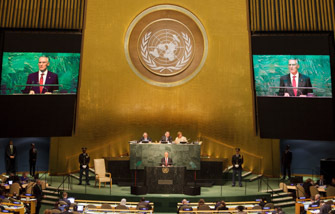
Honourable Mayor of Albufeira
Honourable President of the Municipal Assembly of Albufeira
Honourable Civil Governor
Honourable President of the Metropolitan Assembly of the Algarve
First of all I wish to salute the Albufeira Municipality, on this day when it celebrates 503 years of its being awarded a Town Charter, thus paying tribute to all those who, in democratic Portugal, were chosen by suffrage to serve this County.
Portuguese history, since its inception, has been linked to the organization of local populations, often as a way to assuage their isolation and the absence of a minimally effective central power.
April 25 was the beginning of an unprecedented period of local autonomy, breaching with decades of centralism and stressing the relevance of legitimately and democratically elected local authorities, close to the people.
Local power is undoubtedly, one of the more genuine real results of democracy.
This close relationship between power and the community, exercised with autonomy and total representation, is responsible for the better part of the progress and improvement in the quality of life, freedom and greater social justice, that the Country witnessed in the last 30 years, notwithstanding the much that remains to be done.
Albufeira, as I can testify, is a good example of what I have just said.
Some will say that it could have been different, that certain mistakes could have been avoided. But this does not invalidate in any way the statement, to my mind unarguable that, after these last thirty years, the results of the action of local authorities is extremely positive.
Whoever travels the Country will find, practically in all the counties, the infrastructures and equipment required for development and improvement of quality of life for the people, for the achievement of which the relevant role of local authorities is undeniable.
The virtues of proximity in interpreting the wishes and needs of the people are today the source of increased responsibility and of new challenges for the members of the local authorities.
The core of the battle of the future with which local authorities are faced is, happily, no longer the fight against physical isolation, communications, or the construction of new equipment.
These days, it is quality of life and sustainable development, full social integration of all the people, the fight against poverty, social exclusion and school abandonment, the strengthening of productive capacity and competitiveness of the county, that should muster the efforts of local authorities and dictate local policies.
In our days, local authorities must be active instruments of social development, must have increased regard for the development of entrepreneurial initiative and for the conditions to create new employment, and must support and encourage investment in education and in the improvement of the peoples’ qualifications.
The volume of investment, undeniably essential in the inception of our democracy, has now to give way to its quality, to the balance between development and country planning, to the investment in knowledge, in short, to the setting up of conditions for a balanced and durable growth.
After a historical stage when all the elected local authorities had a decisive role in the building of infrastructures – and I now take advantage to especially salute the councillors present here to-day as co-authors of these historical pages – municipalities should now be in step with the new demands of a global world in accelerated change, establishing adequate policies and mustering the people for the joint and communal actions required by the new age.
It is not an easy task which the Algarve municipalities are facing to guarantee the competitiveness of tourist activities. At a time when tourist destinations are emerging daily, which were previously either inaccessible or fraught with danger, the future must be ensured, otherwise the Country will lose out.
This is the time for a new stage in the history of the democracy of local authorities, its stage of full maturity, as I termed it on another occasion. Apart from the readjustment of priorities, greater cooperation is required between municipalities and the endeavour of each one in mustering the people and in contributing towards the value of the civil institutions, and in the coordination of efforts and skills, in order to achieve a more effective response for the resolution of local issues.
I am certain that Albufeira Municipality will know how to honour its five century old Charter and be able to accept the responsibilities placed by this new age.
The tribute being paid here to-day to nearly 300 councillors who served the county in the last thirty years, and which I am happy to endorse, must be an incentive for those who, now and in the future, bear the responsibility to manage the municipality, to be an example of dedication to the public cause.
© 2006-2016 Presidency of the Portuguese Republic
You have gained access to the records of the Official Site of the Presidency of the Republic from 9 March 2006 to 9 March 2016.
The contents available here were entered in the site during the 10 year period covering the two mandates of President of the Republic Aníbal Cavaco Silva.